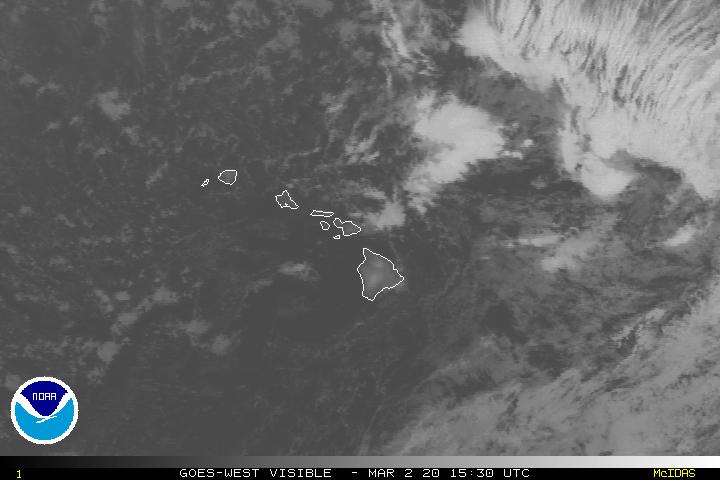Air Temperatures – The following maximum temperatures (F) were recorded across the state of Hawaii Thursday along with the low temperatures Thursday:
84 – 76 Lihue, Kauai
84 – 74 Honolulu, Oahu
84 – 74 Molokai AP
87 – 74 Kahului AP, Maui
85 – 72 Kailua Kona
83 – 70 Hilo AP, Hawaii
Here are the latest 24-hour precipitation totals (in inches) for each of the islands as of Thursday evening:
0.15 Mount Waialeale, Kauai
0.11 Kahuku, Oahu
0.01 Molokai
0.00 Lanai
0.00 Kahoolawe
0.03 West Wailuaiki, Maui
1.08 Kawainui Strean, Big Island
The following numbers represent the strongest wind gusts (mph) as of Thursday evening:
28 Port Allen, Kauai
42 Oahu Forest NWR, Oahu
29 Molokai
39 Lanai
32 Kahoolawe
38 Maalaea Bay, Maui
44 Kealakomo, Big Island
Hawaii’s Mountains – Here’s a link to the live webcam on the summit of our tallest mountain Mauna Kea (nearly 13,800 feet high) on the Big Island of Hawaii. This webcam is available during the daylight hours here in the islands, and at night whenever there’s a big moon shining down. Also, at night you will be able to see the stars — and the sunrise and sunset too — depending upon weather conditions.
Aloha Paragraphs

A storm low pressure system is spinning well to our northeast, with the tail end of an associated cold front pushing south into the tropics, perhaps bringing some showers our way during the weekend

The long frontal cloud band is north, with thunderstorms well south of Hawaii

Scattered low clouds in most directions offshore

A few showers – Looping radar image
Small Craft Advisory…all Hawaiian coasts and channels, until 6pm Saturday
High Surf Advisory…north shores of all the islands, beginning 6am Friday
~~~ Hawaii Weather Narrative ~~~
The rather breezy trade flow will prevail through the rest of this week into next week, with no end in sight. Here’s the latest weather map, showing high pressure systems to the north-northwest and northeast of Hawaii. This elongated zone of high pressure to our north, will continue to see a series of cells moving through it from west to east. This in turn will keep our trade winds empowered, especially during the days, while somewhat lighter at night. These gusty northeast winds are somewhat stronger and more persistent than normal for this time of year. Perhaps the strongest trade wind speeds through this time frame will occur by next Tuesday into Wednesday.
Here’s a wind profile of the offshore waters around the islands – and a closer look
Here’s the Hawaiian Islands Sulfate Aerosol animated graphic, showing vog forecast
Just a few windward showers, increasing some during the upcoming weekend, while the leeward sides remain generally pleasant. An autumn trade wind weather pattern will prevail through the rest of the work week, along with just a few windward showers at times locally. As we push into the weekend, a weak cold front will be carried into the islands, bringing a fairly modest increase in showers. Looking into the longer range, the trade wind weather pattern will hold on tight, with a potential increase in shower activity, especially along the windward sides, arriving around the Thanksgiving holiday.
Marine environment details: The Small Craft Advisory for winds has been expanded through Sunday afternoon for the the entire state.
The new moderately large north-northwest swell is expected to peak Friday, before lowering into the weekend. Advisory level surf is expected on north and west facing shores during the peak of this swell. A series of small northwest swells is then forecast through the following week. Breezy trade winds will maintain choppy surf along east facing shores.
Windy with waves north, west, and east shores…otherwise quite pleasant later autumn conditions
World-wide tropical cyclone activity…
![]()
>>> Atlantic Ocean: No active tropical cyclones
Here’s a satellite image of the Atlantic Ocean
>>> Caribbean
>>> Gulf of Mexico: No active tropical cyclones
Here’s a satellite image of the Caribbean Sea…and the Gulf of Mexico
Here’s the link to the National Hurricane Center (NHC)
>>> Eastern Pacific: No active tropical cyclones
Here’s a wide satellite image that covers the entire area between Mexico, out through the central Pacific…to the International Dateline.
Here’s the link to the National Hurricane Center (NHC)
>>> Central Pacific: No active tropical cyclones
Here’s a link to the Central Pacific Hurricane Center (CPHC)
>>> South Pacific Ocean: No active tropical cyclones
>>> North and South Indian Oceans / Arabian Sea: No active tropical cyclones
Here’s a link to the Joint Typhoon Warning Center (JTWC)
Interesting: Why do seabirds eat plastic? – Heartbreaking stories of seabirds eating plastic — and the accompanying horrible images— are everywhere, but now scientists are an important question: Why do seabirds eat plastic in the first place? And why are some more likely to have bellies full of plastic than others?
The answer, it turns out, lies in a compound called dimethyl sulfide, or DMS, which emits a “chemical scream” that some birds associate with food. When seabirds find chunks of plastic bobbing in the water, they gobble them up, not realizing that they’ve just consumed something very dangerous.
Researchers at the University of California, Davis took some samples of plastic sewn into mesh bags and let them marinate in the ocean before bringing them to the viticulture lab, of all places — the facility has incredibly sensitive equipment for sniffing out unique chemical signatures.
Researchers found that the plastic reeked — from a bird’s perspective, anyway — of DMS, a compound emitted by algae as it breaks down. Algae commonly emits DMS when it’s being snapped up by krill and other microorganisms that some birds feed on, so the smell is essentially like a dinner bell.
This finding also provided insight into why some birds are more prone to eating plastic than others.
Birds that respond to DMS do so because they have a sensitivity to it, and use this scent to track down food sources. Seabirds that don’t rely on algae-eaters for food will still eat plastic, but in much smaller numbers.
The study could also be helpful for examining plastic consumption in species beyond the bird kingdom, and suggests that other compounds in plastics could send out their own signals to hungry wildlife.
But there’s a kicker to the plastic problem.
As plastic drifts in the ocean, it can pick up other exotic chemical compounds, some of which can make birds sick or kill them. When birds respond to the siren song of DMS, they’re also taking in a load of other substances that are wildly unhealthy for them. Clearly, plastic in the ocean is a menace.
Now that we know why some birds consume plastic, is there something we can do about it?
The long answer, of course, is to get rid of plastics and continue aggressive campaigns to clean up deposits of marine debris.
In the short term, though, there’s another possible solution that involves formulating plastics to be less appealing to algae and other organisms that produce DMS. If the compound doesn’t form in the first place, plastic may be less likely to register as a delicious source of potential food.












 Email Glenn James:
Email Glenn James:
Bill Oldham Says:
Hi Glen. Just a question about the Vog site. Lately it seems to just come up blank. Is there a problem or am I too impatient?
Please keep up the weather discussion. We need you insight.
Bill
~~~ Thanks Bill, didn’t know there was a problem, although I was able to put a new link…it seems to be working fine now.
I’ll of course keep my weather discussions updated, glad you appreciate it!
Aloha, Glenn
Eleanor Schofield Says:
Welcome back, Glenn! Glad you had a great vacation, but we are SO happy to have you back, not only to give us detailed forecasts, but to help us understand those bare-bones satellite photos and weather maps!
Aloha, Eleanor (in no-longer-voggy Hilo)
~~~ Hi Eleanor, nice to hear from you, without that vog!
Thanks for your welcome back, I very much appreciate your positive comments about this website.
It’s nice to be back here in upcountry Maui, I enjoyed the cool and clear weather early this morning, with a low of 47 degrees.
Aloha, Glenn
mary in Kihei Says:
Welcome home!
~~~ Hi Mary, thanks!
Aloha, Glenn
woody adamz Says:
Alohas Bruddha Glen…Welcome back to Havai’i Nei…..Read ur Travelogue so know u had a gr8 time….Wishing you Da Bess and,a Big Mahalo for the Seabird Article..it gives me ramification for petitions to companies AND,Trumpssasur our new “furer”…Lol….A Happy Happies 2U
~~~ Hi Woody, thanks for your welcome back!
Aloha, Glenn
Robie Says:
your back yeah……
~~~ Hi Robie, it’s true, I’m back!
Aloha, Glenn